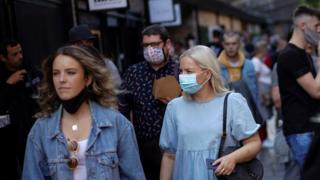 Image copyright
Reuters
Image copyright
Reuters
The UK could see 50,000 new coronavirus cases a day by mid-October without further restrictions, the government's chief scientific adviser has warned.
Sir Patrick Vallance said that "would be expected to lead to about 200 deaths per day" a month after that.
The briefing at Downing St comes as Prime Minister Boris Johnson considers whether to introduce further measures in England.
On Sunday, a further 3,899 daily cases and 18 deaths were reported in the UK.
Speaking alongside the government's chief medical adviser, Prof Chris Whitty, Sir Patrick said: "At the moment we think the epidemic is doubling roughly every seven days.
"If, and that's quite a big if, but if that continues unabated and this grows doubling every seven days... if that continued you would end up with something like 50,000 cases in the middle of October per day.
"50,000 cases per day would be expected to lead a month later, so the middle of November say, to 200-plus deaths per day.
"The challenge therefore is to make sure the doubling time does not stay at seven days."
Prof Whitty added that if cases continued to double every seven days as Sir Patrick had set out, then the UK could "quickly move from really quite small numbers to really very large numbers because of that exponential process".
"So we have, in a bad sense literally turned a corner, although only relatively recently," he said.
The government's most senior science and medical advisers are clearly concerned about the rise in cases that have been seen in recent weeks.
The warning about 50,000 cases a day by mid-October is stark. We don't know for sure how many cases there were at the peak in spring (as there was very limited testing in place) although some estimates put it at 100,000.
However, they were also at pains to point out it was not a prediction.
Even among the government's own advisers there is disagreement over whether what we are seeing is the start of an exponential rise or just a gradual increase in cases, which is what you would expect at this time of year as respiratory viruses tend to circulate more with the reopening of society.
Instead, what was quite telling was the clear social messaging. Even those who are not at a high risk of complications should, they say, play their part in curbing the spread of the virus because if it spreads then difficult decisions will be needed that have profound societal consequences.
But the big unanswered question is what ministers will do next. There is talk of further restrictions being introduced, but that is far from certain.
A couple of things are in our favour that were not in the spring. Better treatments for those who get very sick are now available, while the government is in a better position to protect the vulnerable groups.
Should ministers wait and see what happens? Or should they crack down early, knowing that will have a negative impact in other ways?
Prof Whitty also said that even though different parts of the UK were seeing cases rising at different rates, and even though some age groups are affected more than others, the evolving situation "is all of our problem".
"What we've seen in other countries, and are now clearly seeing here, is that they're not staying just in the younger age groups, and moving up the age bands and the mortality rates will be similar to - slightly lower than they were previously - but they will be similar to what we saw previously."
He said mortality rates from Covid-19 were "significantly greater" than seasonal flu, which killed around 7,000 annually or 20,000 in a bad year.

 5 years ago
815
5 years ago
815 

